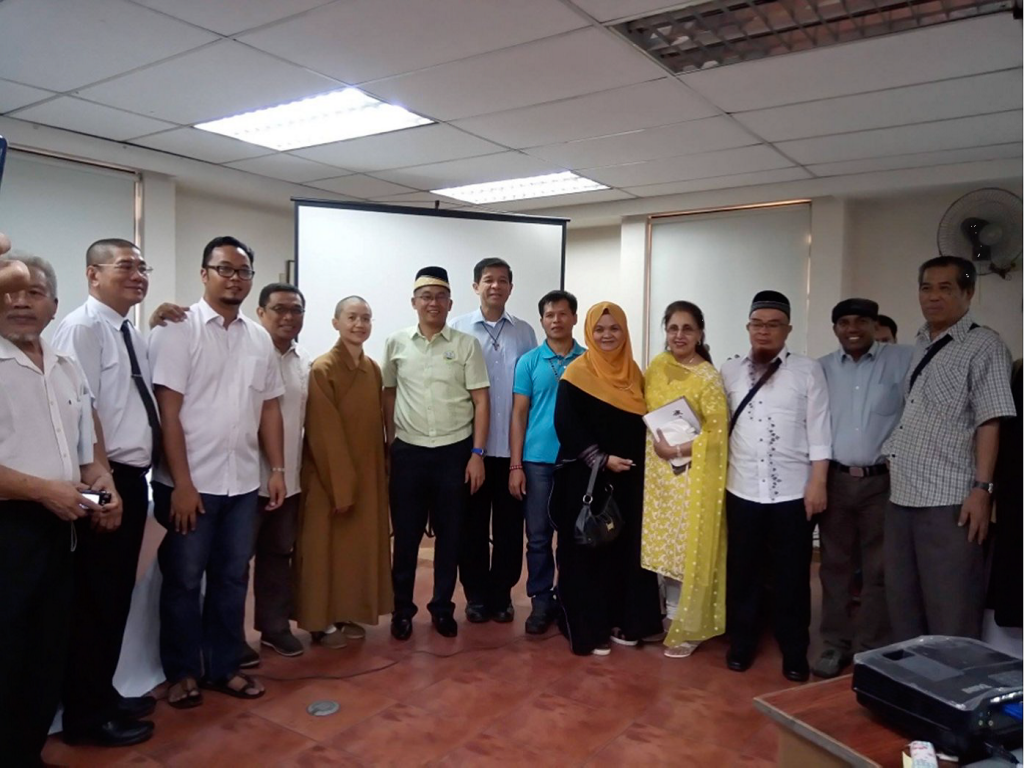Interfaith Forum on Laudato Si in Malate Parish
Fr Kurt Zion Pala, Philippines
A First for the Parish: The Interfaith Forum on Laudato Si and the Interfaith Climate Change Movement
Our Lady of Remedies Parish hosted an interfaith forum on “Laudato Si and the Interfaith Climate Change” on 11 June 2016 from 2:00 to 5:00 pm at the 3rd Floor of the Remedios Jubilee Mission Center (RJMC) as a kick-off activity of the parish’s Laudato Si Week celebration and to support the Sacred Earth Sacred Trust celebrations on 12 June.
This is the first inter-faith gathering in the parish and the event was made even more significant by the presence and active participation of the heads of the various religions.
The opening prayer was led by Malate Church Choir singing “St Francis Prayer Hymn.” Fr Leo Distor, Parish Priest of Our Lady of Remedies, welcomed everyone to the forum. A clip on the Sacred Earth-Sacred Trust global campaign was shown to the group. Fr John Leydon, a co-convenor of the Global Catholic Climate Movement, presented an input on Laudato Si and the Interfaith Climate Change Movement. He then introduced the example set by one small country, Bhutan, through a video clip of Bhutan’s prime minister presenting the efforts of the
country to combat climate change.
A special intermission number was given by some representatives of the parish youth ministry, after which the representatives of various faiths and religions were given the opportunity to respond and present their faith beliefs regarding environmental conservation and the climate
change.
The Interfaith Climate Change Statement was presented to the group and in solidarity with the global movement; the faith leaders adopted and signed the same before the forum ended. A part of the statement includes the following:
Caring for the Earth is our shared responsibility. Each one of us has a “moral responsibility to act,” as so powerfully stated by the Pope’s Encyclical and in the climate change statements by Buddhist,Christian, Hindu, Jewish, Muslim, Sikh and other faith leaders. The planet has already passed safe levels of greenhouse gases in the atmosphere. Unless these levels are rapidly reduced, we risk creating irreversible impacts putting hundreds of millions of lives, of all species, at severe risk. The challenges ahead require honesty and courage and we all must take action to reduce emissions.
The highlight of the forum was the presentation of the statement of the different faith leaders concerning the care of the earth and climate change. The leaders expressed their concern and desire to work together to address the plight of the Earth. They also shared their basic understanding and faith traditions concerning the care for the Earth. Some of them spoke about their experiences in terms of projects and programs already undertaken to address these issues. Excerpts of their statements are available in this report.
Some also recommended that follow-up activities should be done – like a national gathering of leaders for a forum on climate change and possible hands-on and practical projects.
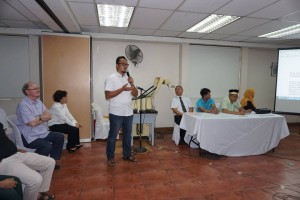 Fr Kurt Pala thanked all the guests who responded to the invitation and expressed his hope that the forum is only a beginning of a fruitful relationship to work together as a family to address climate change and protect the Earth, our common home. A song of a prayer of Pope Francis was shown to close the program.
Fr Kurt Pala thanked all the guests who responded to the invitation and expressed his hope that the forum is only a beginning of a fruitful relationship to work together as a family to address climate change and protect the Earth, our common home. A song of a prayer of Pope Francis was shown to close the program.
After the forum, the participants continued to share their stories and experiences over some refreshments of Indian sweets, Chinese dumplings and Tausug rice cakes.
The faith and religious leaders present at the forum included:
- Msgr Hernando Coronel, Rector of the Minor Basilica of St. John the Baptist (Black Nazarene)
- Fr Leo Distor, Parish Priest of the Our Lady of Remedies
- Imam Ebrar Moxsir, President of the Imam Council of the
Philippines (Islam) - Dr Potre Dirampatan-Diampuan, Senior Representative of the United Religions Initiative (Islam)
- Dr Shakuntala Vaswani, Co-Founder of the Peacemakers’ Circle (Hinduism)
- Ven Master Miao Jing, Abbess of Fo Guang Shan Mabuhay Temple (Buddhism)
- Mr Alfredo Li, CEO of Tzu Chi Foundation, Philippines (Buddhism)
- Mr Bonhao Rivas, Manobo tribe leader, and
- Holly Celeste, National Assembly of Baha’is in the Philippines.
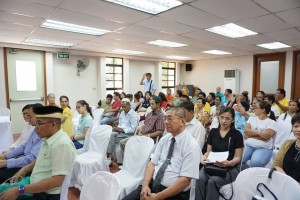 The gathering was attended by about 60 Malate Parish volunteers and around 60 guests from different civic and religious organizations which included the following: Quiapo Church, Sta. Cruz Parish, 350.org, Khayrah Umma, Imman Council of the Philippines, Zentech Global, Habitat Humanity, Religious Discernment Group, Tzu Chi Foundation, Inc, Church People Workers Solidarity, Katribu, Columban Lay Missionaries, Great Work Movement, St Scholastica JPIC, Fo Guang Shan Mabuhay Temple, Peacemakers’ Circle Foundation Inc,
The gathering was attended by about 60 Malate Parish volunteers and around 60 guests from different civic and religious organizations which included the following: Quiapo Church, Sta. Cruz Parish, 350.org, Khayrah Umma, Imman Council of the Philippines, Zentech Global, Habitat Humanity, Religious Discernment Group, Tzu Chi Foundation, Inc, Church People Workers Solidarity, Katribu, Columban Lay Missionaries, Great Work Movement, St Scholastica JPIC, Fo Guang Shan Mabuhay Temple, Peacemakers’ Circle Foundation Inc,
Silsilah Dialogue Movement, United Religions Initiative and the Al-Mufarrudin Masjid, Malate.
The faith traditions represented in the forum were Hinduism, Buddhism, Christianity, Baha’i faith and Islam.
Excerpts of Statements
The Quiapo Experience on Disaster Risk Reduction and Climate Change Adaptation (DRRCCA ). The aim is to build resilient communities; Baseco and Parola were identified. According to studies these groups are the most vulnerable and the poorest, those lacking in capacity, they are the groups that will be hit the most. That is why it is our initiative with groups in the parish like the Hijos who are members of the balangay (devotees of the Black Nazarene) to help out the members during crisis, calamity or disaster like a 7.2 earthquake, particularly the poor and
vulnerable.
Fr Hernando Coronel (Christian)
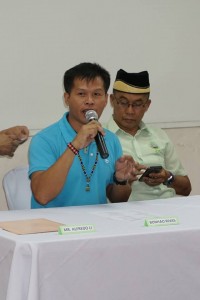 We the Indigenous Peoples are very pleased of having the opportunity to be a part of this gathering as a response to the call of our Pope for the protection of our environment.
We the Indigenous Peoples are very pleased of having the opportunity to be a part of this gathering as a response to the call of our Pope for the protection of our environment.
Dahil ang mga katutubo ay kinikilala naming naka-ugat ang aming buhay sa kalikasan. Kung wala ang kalikasan at ang mga lupaing ninuno maglalaho din ang aming identidad bilang mga katutubo.
We do not separate our efforts to defend our ancestral lands from caring for the environment even before the outsiders came. Our lives are rooted in nature. Without our land and without the environment, our identity is lost. We cannot call ourselves ‘katutubo’ (indigenous peoples) without our land and the earth. The Divine, “Haring Magbabaya” is also rooted in Nature. When nature is lost, when the forest is gone, when the river is polluted, the Divine will also be lost.
Mr Bonhao Rivas (Indigenous People, Manobo)
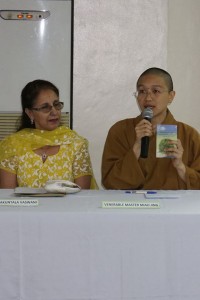 We need to realize that the environment is related to man. Man, nature and mind are actually one. We will have to practice oneness and coexistence with ourselves (body and mind), man and man and together coexist with nature. Because man, mind and nature are actually one.
We need to realize that the environment is related to man. Man, nature and mind are actually one. We will have to practice oneness and coexistence with ourselves (body and mind), man and man and together coexist with nature. Because man, mind and nature are actually one.
Venerable Master Hsing Yun (our founder) is willing to be the one bird that will save the forest from fire. In the scripture it is said that a bird was trying to put out a fire by going to the river and bring back a mouthful of water to put out the fire. Then the heavenly King asked the bird, “Why it is doing it? The effort is very minimal or little and could kill yourself flying to and fro from the river to the forest”. The bird replied that “I am doing my part. This is my role because the forest is my home. I am doing my part to be a family.”
Ven Master Miao Jing (Buddhist)
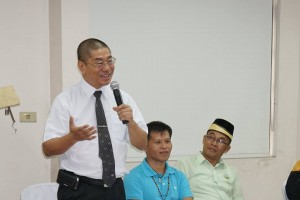 Our foundation is called Buddhist Compassion Relief Tzu Chi Foundation. Tzu Chi are two Chinese words: Tzu means mercy, compassion, love, kindness. Chi means relief, help, to give. In the name of our organization and the teachings of our founder, Dharma Master Cheng Yen, when we help people it must come from the heart.
Our foundation is called Buddhist Compassion Relief Tzu Chi Foundation. Tzu Chi are two Chinese words: Tzu means mercy, compassion, love, kindness. Chi means relief, help, to give. In the name of our organization and the teachings of our founder, Dharma Master Cheng Yen, when we help people it must come from the heart.
Another thing is PET bottles. When we drink mineral water, what do we do? We throw it away and it goes to the canal, the river and then it goes to the sea. The PET bottle remains a PET bottle in 100 years. In the Pacific Ocean there is a big island with plastics already. Our founder said, “If you can make nylon into clothes, why not PET bottles into clothes and usable products?”
I would like to show you what we brought with us. These blankets and shirts are made from PET bottles. There are commercial companies who make products from PET bottles but they are virgin PET bottles; but Tzu Chi is from recycled bottles. We recycle them and make them into shirts and blankets. And during typhoon Yolanda, we gave out 75,000 blankets in Leyte.
Mr Alfredo Li (Buddhist)
We, the Imam Council of the Philippines, will supports this Forum on Thinking, Planning and Doing together to promote greater awareness and action in environmental protection and preservation among the
many religions in our beloved country through discussion and dialogue.
The ICPI have been thinking about how we can care more for our mother earth. We talked about how our fellow Muslim Filipinos inspires to care for creation. I would like to share with you what we discuss during our regular meeting: everything we do has an impact on others, and also the earth (an example is smoking, which harms us, others and the air we breathe); Islam teaches us to preserve water and also Islamic teaching is about not doing harm, so we must care for the environment, for example we can use cloth bags for marketing or shopping rather than plastic ones.
Imam Ebrar Moxsir (Muslim)
To the Hindus the whole of creation is divine. They are sacred as said also in Christianity. All living things like people, animals and plants including non-living things like rivers and mountains they are all part of our beautiful Mother Earth. They are all to be treated with respect. Each one of us must share and care for the mountains and all. We have seen the Catholic Church has taken the lead and the world is following. We have to raise our consciousness to see that this is our Earth. We breathe the same air. We have the same sunlight. And if we will misuse it or for our selfish purposes. Then ultimately it will come back to us and we will suffer.
We can put it in a statement that we support the initiative of the Pope and of course we will in our community try and raise awareness. Our generation we have done so much harm and we must have a cleaner environment for our next generation to grow and also to initiate the young generation into the practical ways of saving the environment.
Dr. Shakuntala Vaswani (Hindu)
You will be surprised that there is an abundance of verses in the Holy Quran that talk about our responsibility as vice stewards of earth on how we should deal, how we should protect and how we should relate with mother nature. And one whole chapter called Al-Rahman which tells us about the magnificence and glory of Allah, indeed in all his creation, not only man but the whole of the cosmos.
I would like to steer the thinking of everybody that the faiths are the real and best alternative for everyone to be conscious now of our responsibilities because any violation of the various teachings of our faiths is considered a sin. So I would like to challenge everyone that we create, we come together as one big force, that we can stage a national summit of interfaith gathering on climate change something like that. And all of our faiths can give in their own resources from their own faith traditions, from our own religions and then bring this back to our people, to our own faith communities. And make everyone aware of our own responsibility as creation of God.
Dr Potre Dirampatan – Diampuan (Muslim)
Religion offers an understanding of human existence and development that lifts the eye from the rocky path to the distant horizon. And when the true spirit of its transcendent founders, religion has been one of the most powerful forces for the creation of new and beneficial patterns of individual and collective life.
Religion therefore offers a vital source of commitment to new and potentially challenging patters of daily life. It is notable that religious leaders and faith-based organizations have been increasingly active on environmental and social issues as they relate to climate change. Action on issues of sustainability is often grounded in the sentiment that we all live on the same planet. But truly transforming individual and collective patterns of life will require a much deeper appreciation of the inter-connectedness of the planetary biosphere. People and the environment are inter-connected aspects of one organically integrated system. At this point of history, neither can be accurately understood in isolation from the other.
Ma. Asuncion Newman (Baha’i Faith)

